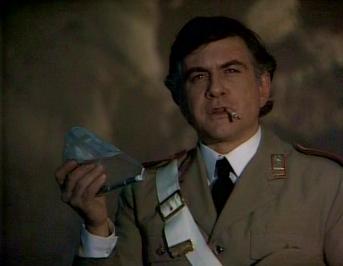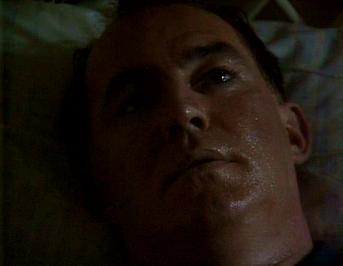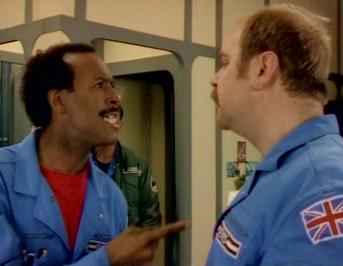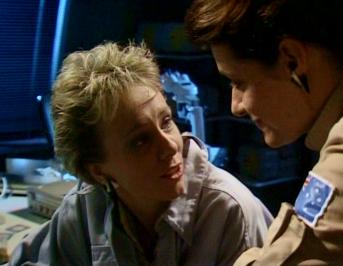|
Episode Five : This Case to be Opened in a Million Years
|
||||

|
||||
|
  Character Development: Theroux's father was killed from a radiation leak from a nuclear booster. Nathan has never visited Italy or Venice, but had planned a European tour that year with Lee. Having been in space for an excess period of duty, the Medical Personnel Monitor states he must return to Earth for a minimum of seven days. Box was manufactured in the Recondite Components Factory in Guildford. The factory was closed in 2025. Future lives: This was the first episode to really clarify the time period for the series. Although Lee Jones's gravestone in Conversations With The Dead contained the date, it was a brief two second shot, lost on most viewers. The series is finally placed in the 2026/2027 timeband here by nature of a computer monitor that shows a suspect born in 1993 being thirty-four years of age. Venice is now submerged underwater, and a "big five" nations are referred to. It is not specified what these five nations are, though previous episodes would seem to indicate America, Australia, China, Japan and Russia. It definitely does not include Italy. The Starcops have a new female personnel officer. Also, a two-day package holiday to Peru from Italy is revealed to cost 917 Eurodollars, with day-to-day expenses totalling 37 Eurodollars. Future companies are the Sunzec Unit and Santoni-Italia. There is a European centralised police force. Also referred to are "Strato-Transcender Flights". The Solutions: The Mafia is still in existence in the twenty-first century, smuggling Uranium aboard launch rockets to disused space station S9. A Moonquake meant a launch was aborted, and a cover of nuclear waste was invented to prevent investigation. After the Mafia are given orders to disgrace the Star Cops, they use Angelo Pordenone - a rocketry guidance engineer, safety controller and heroin concentrate 46 smuggler - to kill Nathan. Podenone dies himself in the attempt, leaving Nathan framed for murder with a planted stash of heroin in his hotel room and 105,000 Eurodollars in his account. Nathan investigates the waste to prove it is non-nuclear, and exposes the plot... Nathan and David's Movie-Buff Challenge: Nathan's hallucinations while under the forced influence of drugs are a direct homage to Farewell, My Lovely, which he also name-checks twice. He asks David, when being relieved of his command, whether he's quoting from The Caine Mutiny. The idea of David and Nathan being film buffs was Chris Boucher's idea and from this point on, with his lesser involvement in the writing, it began to fade out. Trivia: Writer Philip Martin is probably most famous for his series Gangsters, which was looked at in a 2016 article on this site. Things To Look Out For: Although never confirmed anywhere or referenced on the commentary, I remain convinced that David Calder hitting his foot on the door frame at the end of the episode was a mistake, his "damn it!" dubbed on in post-production to cover it. Unmade Episode: Philip Martin wrote a second script for the series, "Death On The Moon", which was due to be the ninth of ten episodes, but was scrapped due to an electrician's strike action at the BBC. On the DVD boxset there's an interview with the writer, "PM's Question Time", where he reveals that the episode would have been an "Agatha Christie style basis mystery, whodunit." In the end event, a backlog of unmade programmes caused the BBC to drop production, and bring forward the original tenth episode, Information Received (retitled Little Green Men and Other Martians) to conclude the series. DVD Commentary Highlights (Philip Martin): "I'm a great admirer of David Calder's work [...] Whereas at the time when this was first shown, it seemed a rather... cold, objective performance - although it isn't, of course - but it didn't have the rather false charm that a lot of leading men had at that time. And he is the anti-hero, and he reminds me quite a bit of a previous hero of mine, which was John Kline in the series I wrote called Gangsters... he has an existential quality, a query of understatement and reality that I always like in people who play leading roles in my things." "This Russian Controller figure, I was never sure about, really... and in fact I had a lot of trouble writing for him [...] I remember struggling to do it, to find some conflict for the scenes, to find some interest for the scenes, but I think it's... maybe it was a bit bland."   Viewpoint 2017: "She's right, you are a bitch!" Graeme Harper is a terrific director in that he instinctively realised if you've got a space series set 40 years in the future using BBC micros.... turn the lights down. As one would expect from the writer of the brilliant Gangsters, there's a metatextual element to this episode, with Farewell, My Lovely even being directly name-checked as well as homaged. Due to the somewhat complicated plotlines, this one may not shine on first viewing, but rewards repeated watches. It's not all a success. The "Italian" accents on display are highly shaky, the incidental music is often like a mash up of Keff McCulloch/Zombie Flesh Eaters, and it does also showcase Erick Ray Evans's weakest performance as Theroux. The sole search result on The Guardian website has the series slated as "rubbish" and "a small bunch of actors in twill leisure suits shouting at each other in space", and this is one of many episodes that does play down to that negative stereotype. The yelling scenes between Theroux and Devis are very badly staged and do look amateurish, as does a later scene where Theroux bares his soul about his dead father. It's tempting to assume that a more experienced actor could have pulled it off, as David Calder is more adept with such material, but it's surely even beyond Calder's ability to deliver a line as clunky as "... all I could think of was my poor, ravaged father, I watched the process of destruction that ended in his death." One way in which the series is very progressive is that it presents homosexual characters in SF, something of a groundbreaking event in 1987. Although this does give us a sci-fi show with a questionable "evil lesbian" motif (a trap Quantum Leap also fell into), it's well written, integrated into the narrative without insulting the intelligence of the viewers by explicitly spelling it out. As Philip Martin states on the episode's commentary track, Kenzy "senses the attraction between them, and starts the process of developing it for her own investigative purposes." (Martin also states that the lesbianism had to be "concealed" in order to get it past BBC department heads of the time). The whole thing does end with a Scooby Dooesque ranting maniac shouting out all his plans while trying to kill Nathan, but, overall, it works well.     Average Rating: This episode has averaged 3.4 out of 5 in the reviews on this site. |
||||